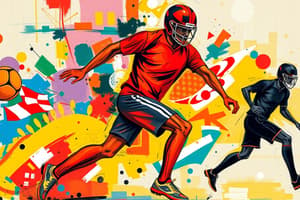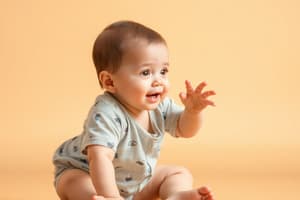Podcast
Questions and Answers
The study of motor behavior in terms of relatively permanent gains in motor skill capability as a result of practice or experience is called __________.
The study of motor behavior in terms of relatively permanent gains in motor skill capability as a result of practice or experience is called __________.
- motor learning (correct)
- motor development
- motor control
- motor behavior
Infants may use a variety of types of locomotion. For example, __________ is defined as infants moving on hands and knees.
Infants may use a variety of types of locomotion. For example, __________ is defined as infants moving on hands and knees.
- crawling
- quadrupedal gait
- creeping (correct)
- walking
The ___________________ perspective of motor development has many constraints or systems that exist both within the body and outside the body when observing the development of motor skills across the life span.
The ___________________ perspective of motor development has many constraints or systems that exist both within the body and outside the body when observing the development of motor skills across the life span.
- Information processing
- Maturational
- Ecological (correct)
- Biomechanical descriptive
One major reason motor behaviors change frequently and dramatically throughout childhood is the growth of the skeletal, muscular, and nervous systems, which allows a child to __________________ and move differently.
One major reason motor behaviors change frequently and dramatically throughout childhood is the growth of the skeletal, muscular, and nervous systems, which allows a child to __________________ and move differently.
Which of the following could be considered an individual constraint (rate limiter) for hopping on one foot?
Which of the following could be considered an individual constraint (rate limiter) for hopping on one foot?
A(n) _______ intervention for infants with Down syndrome is evidenced to promote earlier onset of __________.
A(n) _______ intervention for infants with Down syndrome is evidenced to promote earlier onset of __________.
A skilled walker adopts the ____________ pattern to assist the full range of leg motion.
A skilled walker adopts the ____________ pattern to assist the full range of leg motion.
Maximal performance of motor skills often requires performers to minimize stability to increase mobility.
Maximal performance of motor skills often requires performers to minimize stability to increase mobility.
Environment constraints are global and not task specific.
Environment constraints are global and not task specific.
Sliding develops after galloping.
Sliding develops after galloping.
Gibson, the creator of the perception-action approach, proposed that the CNS is responsible for the infinite calculations that estimate and determine the speed and direction of both people and objects with regard to movement.
Gibson, the creator of the perception-action approach, proposed that the CNS is responsible for the infinite calculations that estimate and determine the speed and direction of both people and objects with regard to movement.
In the skill of running, the degree of knee flexion on the recovery swing would be considered a product measure.
In the skill of running, the degree of knee flexion on the recovery swing would be considered a product measure.
According to a dynamical systems perspective, the most important factor in the motor development of an infant is physical growth.
According to a dynamical systems perspective, the most important factor in the motor development of an infant is physical growth.
The dynamical systems approach and the maturational perspective are often in agreement with each other regarding topics in motor development.
The dynamical systems approach and the maturational perspective are often in agreement with each other regarding topics in motor development.
Any given type of constraint is often considered negative with regard to movement.
Any given type of constraint is often considered negative with regard to movement.
Supine kicking is an example of a motor milestone.
Supine kicking is an example of a motor milestone.
Universality represents individual differences in motor development.
Universality represents individual differences in motor development.
Motor development is limited to the period from birth to young adulthood.
Motor development is limited to the period from birth to young adulthood.
Running usually develops 6-7 months after walking.
Running usually develops 6-7 months after walking.
To gallop, individuals must uncouple their legs from the 66% phasing used when they walk and run.
To gallop, individuals must uncouple their legs from the 66% phasing used when they walk and run.
Suppose you are using the body component method to assess an individual's developmental level for horizontal jumping. An individual who displays the highest level of movement proficiency would have which of the following developmental (summary) profiles?
Suppose you are using the body component method to assess an individual's developmental level for horizontal jumping. An individual who displays the highest level of movement proficiency would have which of the following developmental (summary) profiles?
In the skill of horizontal jumping, when the arms do not extend behind the body during the preparatory crouch, the arm action cannot be higher than what step?
In the skill of horizontal jumping, when the arms do not extend behind the body during the preparatory crouch, the arm action cannot be higher than what step?
Suppose you are using the body component method to assess an individual's developmental level for hopping. An individual who displays the highest level of movement proficiency would have which of the following developmental (summary) profiles?
Suppose you are using the body component method to assess an individual's developmental level for hopping. An individual who displays the highest level of movement proficiency would have which of the following developmental (summary) profiles?
Flashcards are hidden until you start studying
Study Notes
Motor Learning
- Focuses on permanent gains in motor skill through practice or experience.
- Important terms include motor control, motor development, and motor behavior.
Infant Locomotion
- Creeping defined as moving on hands and knees.
- Other forms include walking, quadrupedal gait, and crawling.
Motor Development Perspectives
- Ecological perspective emphasizes constraints within and outside the body affecting motor skills across a lifespan.
- Other viewpoints include maturational, biomechanical, and information processing.
Growth and Motor Behavior
- Development of skeletal, muscular, and nervous systems enhances the ability to produce more force and change movement patterns.
Individual Constraints in Motor Skills
- Strength can be a rate limiter for skills like hopping.
- Environmental factors and personal attributes affect performance.
Developmental Interventions
- Treadmill training recognized for promoting earlier walking in infants with Down syndrome.
Walking Patterns
- Double knee-lock pattern aids skilled walking with a specific leg motion sequence.
True/False Assertions
- Maximal performance often requires less stability for increased mobility.
- Environmental constraints are generally non-specific to tasks.
- Sliding skill develops post-galloping.
- Incorrect assertions include that CNS manages calculations for movement, knee flexion in running is not a product measure, and physical growth is not the sole factor in motor development.
- Several statements are false: dynamical systems agree with maturational perspectives, constraints are not always negative, and concepts like universality relate to individual differences.
Motor Development Timeline
- Running typically emerges 6-7 months after walking.
- Galloping requires uncoupling leg movement from walking and running patterns.
Developmental Levels in Skills
- Highest proficiency in horizontal jumping corresponds to a profile of 4-4.
- Proper arm extension is crucial in horizontal jumping, limited by actions in step 2.
- In hopping, the highest level profile is 4-5.
Understanding Skill Development
- Profiling levels aids in assessing movement proficiency among individuals.
Studying That Suits You
Use AI to generate personalized quizzes and flashcards to suit your learning preferences.




